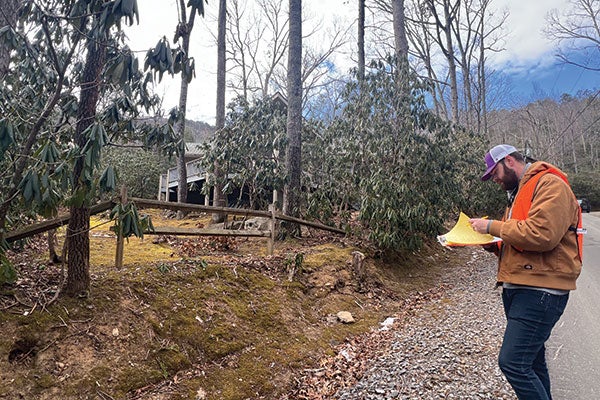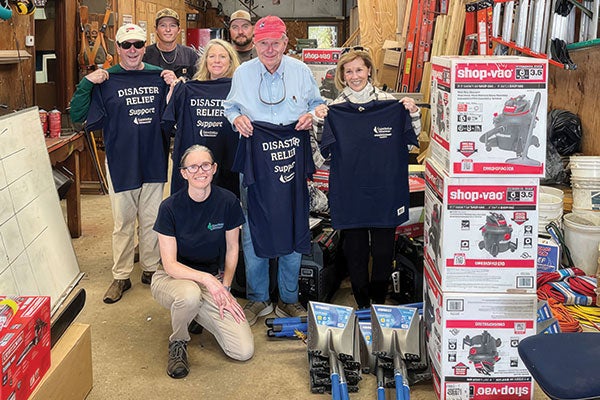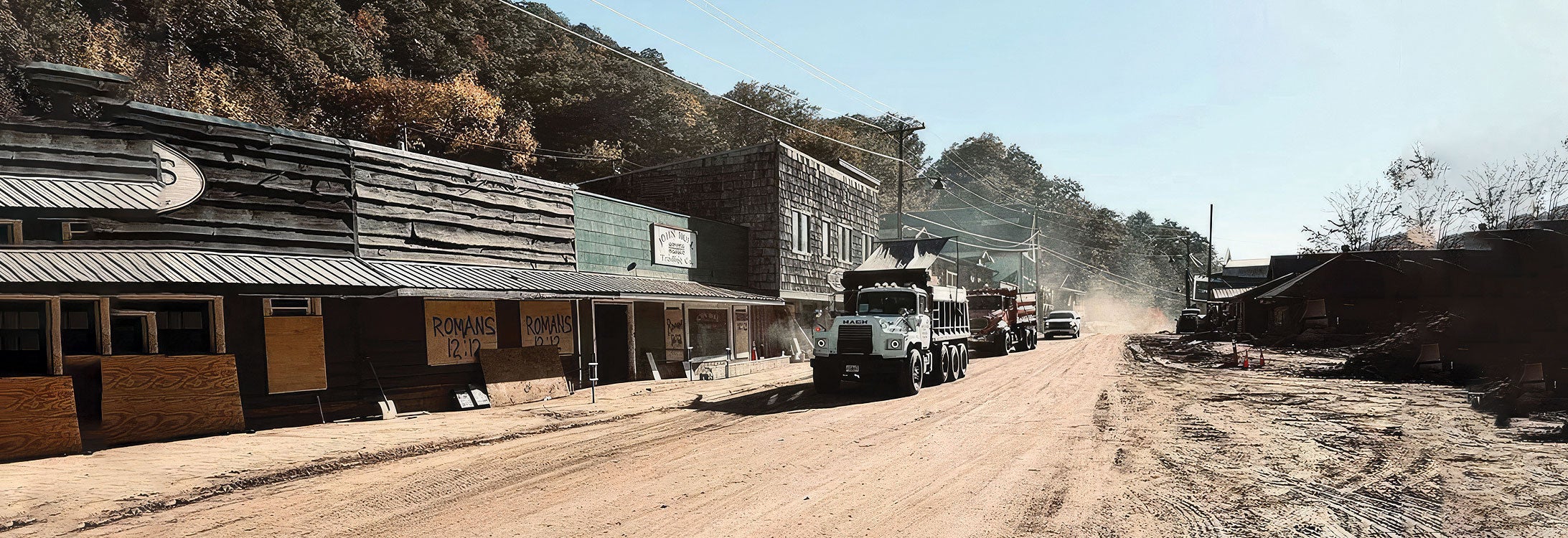Pirate Nation rolls to rebuild WNC
Pirate Nation pulled together in the fall to help western North Carolina following Hurricane Helene’s devastation. This spring, they continued to the next steps: rebuilding what’s gone and preserving what’s still there.

Harley Drange, a first year graduate student in the Department of History, was one of 12 ECU students to assist with a survey of historic homes in western North Carolina in January as part of a service project run by the Preservation Society of Asheville and Buncombe County. (Photo by Jennifer McKinnon)
Bob Barnhill ’70, chairman of the board for Barnhill Contracting Company of Rocky Mount, put his company to work in the region.
Crews from the company’s Raleigh and heavy highway divisions have been hard at work on road repairs. Barnhill noted a particular 5-mile stretch of N.C. 80 near Marion where flooding took one lane of the two-lane highway and sent it cascading down the mountain. The company’s crews have been working to stabilize the slopes, grade roadside ditches and place riprap — stones designed to protect the soil from eroding — so the road that intersects the Blue Ridge Parkway can be repaved and fully restored.
“The damage to the road system in western North Carolina is far worse than anything we have ever seen,” Barnhill said. “The number of people that lost their homes and businesses makes getting the roads back open even more critical for fellow North Carolinians. We have pledged to do all we can to help speed up this process.”
Dekota Marshall ’10, a former Pirate football player and owner of 1st and Goal Hauling of Raleigh, has his trucks hauling materials to rebuild roads in western North Carolina.
“There are roads washed away, downed trees, houses upside down or completely destroyed, burned vehicles, debris everywhere, piles of mud, upside-down vehicles, power lines down, trees on top of houses,” he said.
The work hasn’t been easy.
“A lot of the challenges we have faced is seeing the roads weren’t built for big dump trucks,” he said. “The roads are very small along the mountainsides. You have to really watch the roads to make sure your truck can navigate safely. While driving, we have had roads collapse because of erosion. Some trucks have turned over on sharp curves, and some have hit the mountainside.”
He is proud of his workers and what they have done to support storm victims.

Bob Barnhill, an ECU alumnus and chairman of the board for Barnhill Contracting Company, stands with others amid storm relief supplies donated for western North Carolina. (Contributed photo)
“We have helped to open a lot of roads and bridges for the locals to get back to everyday life,” he said. “There is a lot of work to be done there. I don’t see my company leaving the area until the last load is hauled. We started the job and will finish the job.”
David Price ’05, owner of David Price Construction and first vice president of the N.C. Home Builders Association, said the organization went to work immediately after the storm.
“We have raised over $600,000 for grants for our members and their employees who have been directly affected,” Price said. “We also worked with the U.S. Veterans Corps of Raleigh to fly Starlink into affected areas when they had no means of getting in touch with the outside world over the first month or so after the storm. We have sent tractor-trailers of construction supplies, clothes, cleaning supplies, food, etc. We worked with Lowe’s to build 100 tiny homes that people are now living in instead of tents.”
And in January, ECU students and staff worked with the Preservation Society of Asheville and Buncombe County to conduct a historic house survey in Montreat, which took significant damage from the hurricane. The team surveyed about 400 historic properties, some dating back to 1898, to assess damage and contribute to recovery efforts.
Led by Jennifer McKinnon, a professor of history with extensive experience in community archaeology, and Chelsea Freeland, a research fellow and Montreat resident, the project aimed to document the storm’s impact and assist with preservation. Twelve graduate students participated, using their academic skills in a real-world setting. The survey will help inform rebuilding efforts and assess historic properties’ needs. The experience also provided students with valuable disaster recovery insight and a deeper connection to the affected community.
“The students surveyed 400 houses in two days, which is one-third of the survey that needs to be accomplished by the preservation board. So it was a huge help,” McKinnon said. “This allowed students to use their classroom skills to contribute to the efforts of recovery in the region and assist in the preservation of houses from the late 1800s to the 1970s.”
Price, who came to ECU shortly after Hurricane Floyd devastated eastern North Carolina with historic flooding in 1999, said the recovery will be long.
“We have seen destruction before, but not on the scale of what we are seeing in western North Carolina after this storm,” he said. “Only a few storms have brought this type of destruction, but not this widespread. Please help these people any way that you personally can. They will need it for years to come.”
